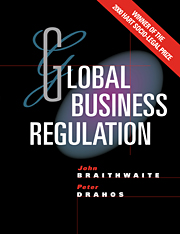24 - Forum-shifting and Contests of Principles
Published online by Cambridge University Press: 04 August 2020
Summary
Forum-shopping, in the words of one US judge, is a ‘national legal pastime' in the US (Wright 1967: 333). Plaintiffs spend a lot of time shopping around for a jurisdiction that they believe will give their case the best chance. The growth of international commercial arbitration allowed TNCs a more global smorgasbord of sites, of rules of the game - some more common-law, some more civil-law, some more informal, some enclaves of Western law within communist states (Dezalay & Garth 1996).
International forum-shifting was not an important strategy prior to the Second World War, when the number of international fora was so small as to afford little choice. It became an important strategy for the first time during the era of US hegemony. The US state in fact translated its 'national legal pastime’ of forum-shifting into the realm of international regulatory contests. When it is staring at defeat on a given regulatory agenda in a given international forum it shifts that agenda to another forum, or simply abandons that forum. Part of its thinking behind abandonment is that the abandoned international organization will be shocked into a more compliant mode of behaviour, endeavouring to woo back the world's most powerful state (and its financial contributions) with more favourable policies and attitudes. This fate, we shall see, befell the UN Educational, Scientific and Cultural Organization (UNESCO). On other occasions forum-shifting is used to run a parallel agenda in two international fora. Here the strategy is to cast both fora in the role of warring suitors, making each strive to do better than the other in terms of fulfilling the regulatory desires of the US. The World Intellectual Property Organization (WIPO) found itself competing in this way with the WTO when the latter was also given jurisdiction over intellectual property.
Forum-shifting thus encompasses three kinds of strategies - moving an agenda from one organization to another, abandoning an organization and pursuing the same agenda in more than one organization. For the sake of completeness we should also mention a strategy that might be termed a ‘forum-blocking’ strategy. This is where the powerful state ensures that an international organization does not become a forum for an agenda that threatens its interests. In our fieldwork we came across one clear example. Copyright is not, as one UNESCO official told us, a priority area in the organization.
- Type
- Chapter
- Information
- Global Business Regulation , pp. 564 - 577Publisher: Cambridge University PressPrint publication year: 2000
- 5
- Cited by



